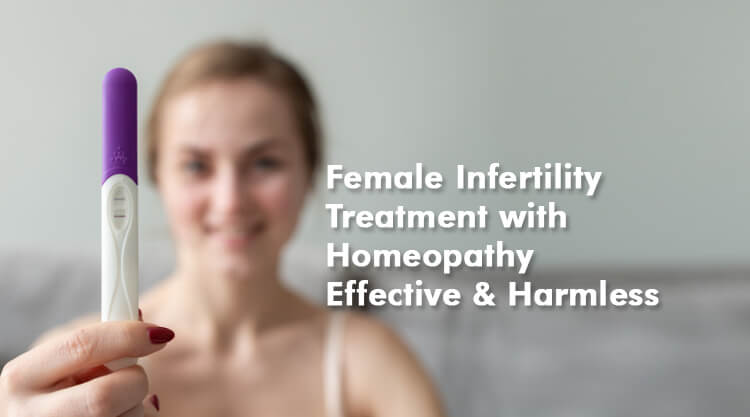
Female infertility is one of the most common problems that plague women of childbearing age. It can result from hormonal issues, physical issues, age, environmental factors, or lifestyle. Female infertility treatment with homeopathy is one of the surest ways of dealing with this issue.
Frankly speaking, there are two common causes of female infertility. In primary ovarian insufficiency, a woman’s ovaries stop producing eggs even before natural menopause. In PCOS, the ovaries do not release eggs on time or do not release healthy eggs. The latter also leads to miscarriages.
Recommended reading: Homeopathic Treatment for Fungal Infection
Female Infertility Treatment and Effects
Causes
Given below are the chief causes of female infertility:
-
Damaged Fallopian Tubes
Fallopian tubes act as a passage for eggs to pass from the ovaries to the uterus. Now, if they get damaged in case of scars from pelvic surgery, endometriosis, pelvic infections, and so on, then sperms fail to reach the eggs in the tube. Thus, this causes infertility.
Recommended reading: Homeopathy Medicine for Acne
-
Uterine Fibroids
These are clumps of non-cancerous cells on the walls of the uterus. Although they are usually not harmful, sometimes they can get bigger and cause numerous health problems, including infertility.
-
Hormonal Imbalance
Hormonal imbalance is the most common cause of infertility in women. It disrupts ovulation, prevents thickening of the uterine line, and can delay or prevent the fertilisation process from occurring. Female infertility treatment with homeopathy is the most effective and doesn’t lead to any side-effects.
Which Hormones impact fertility?
Before seeking infertility treatment, it is imperative to know which hormones cause female infertility.
-
Thyroid Hormones
Thyroid hormones are tied to reproduction in women. Malfunctioning thyroid hormones can harm female fertility.
Recommended reading: Homeopathy Treatment for Anxiety
-
Progesterone
This is one of the most important hormones in maintaining pregnancy. Progesterone aids in thickening the uterine lines that help support the embryo. Without this hormone, miscarriages become common, and conception becomes difficult.
-
Follicle-stimulating hormones (FSH)
This is the key hormone in regulating the menstrual cycle and helping in the production of eggs. A higher level of FSH results in improper functioning of the ovaries.
-
Prolactin
Although this hormone is mainly responsible for breast milk production, it also plays a critical role in conception. When prolactin levels aren’t balanced properly, they can cause an irregular menstrual cycle, which in turn affects fertility.
Symptoms
Some of the more common symptoms of female infertility are quickly apparent. They include:
-
Irregular menstrual cycle
If your period is scanty, infrequent, or leads to heavy or painful bleeding, then it’s a sign of a hormonal problem. This can worsen to cause infertility issues.
Recommended reading: How Hormonal Imbalance Affects Women?
-
Worsening acne
Suppose you notice the sudden appearance of acne or worsening of your present acne issues. In that case, it’s largely due to hormonal issues and can be either due to endometriosis or PCOS. Another skin issue that is an underlying sign of hormonal malfunctioning is the sudden appearance of excessive facial hair.
-
Unexplained weight gain
Sudden loss of weight or weight gain is due to an imbalance in the thyroid hormones, which can lead to infertility.
Female Infertility Treatment through Homeopathy
Management of female infertility through homeopathy is one of the best ways to overcome the problem and conceive naturally.
It is important to visit a good homeopathy clinic and seek a reputed homeopathic doctor at the very outset. Female infertility treatment with homeopathy is vast and can depend from person to person.
Recommended reading: What is homeopathic medicine and How does it work
However, the best part about it is that you’ll see results without any side-effects. The doctor goes through your medical history and looks for what exactly is causing infertility issues. Once that is diagnosed, they proceed towards treatment. Medication can be given in the form of tinctures, granules, or liquid.



